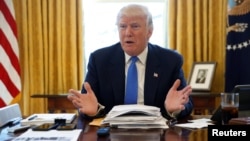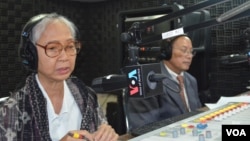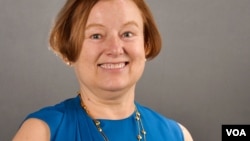Prime Minister Hun Sen and other senior officials have, using U.S. President Donald Trump as a pretext, threatened to expel media outlets from the country for unfavorable coverage.
Following Trump’s attacks on the media, which include barring the New York Times, CNN and other outlets from press conferences, the Cambodian government has said it will “take action” against media it sees as “threatening the country”.
Phay Siphan, senior government spokesman, told VOA Khmer this week that it saw international broadcasters Voice of America and Radio Free Asia, along with local radio station Voice of Democracy as “subversive”.
“You could say my post was threatening. It depends of your freedom of thought. As the mandated government, we have to defend Cambodia’s interest since those three stations are foreign-owned,” he said.
“Why is it OK for the United States to do it and when Cambodia reacts ... we are accused of dictatorship?”
Moeun Chhean Narridh, director of the Cambodia Institute for Media Studies, said he thought comparing the United States and Cambodia when it came to media freedoms was a “misunderstanding since the U.S. context is different from Cambodia, where freedom of the press is still much younger.”
He added that while the media must remain independent, it must also be objective. The “subversive” radio stations mentioned by Siphan, he said, “adhere to professionalism.”
“They balance their reports by getting responses from other sides, such as from the government.”
“If there is suppression of the press, it does not only violate the constitution, but also the government and society does not benefit, since society can only move forward when people can fully access information,” he said.
Although Cambodia’s constitution provides for a free press, most media is controlled by pro-government business interests and its output are closely monitored.
In late February, Prime Minister Hun Sen mocked the United States, which his government sees as hypocritical when it comes to advocating for human rights and press freedom. “So condemn Trump as a dictator,” he jibed.
Pa Nguon Teang, executive director of the Cambodian Center for Independent Media, which runs Voice of Democracy, said Trump’s stance on the media provided “a bad example for the world’s leaders, especially dictators.”
In response to the Cambodian government’s threats, he said Voice of Democracy was an independent media outlet that had always acted professionally.
Jing Zhang, managing editor of VOA’s East Asia Pacific Division, rejected the characterization of “foreign agent”.
"VOA is a media organization that reports news in an objective, fair and balanced manner," he said. "Millions of VOA listeners and Facebook fans in Cambodia can attest to our journalistic integrity."
Voice of America Director Amanda Bennett expressed support for VOA's work in Cambodia and around the world.
“For decades, Voice of America has been a model of the very American bedrock of values of a free and independent press,” Bennett wrote in an email to the New York Times. “Those are the principles we have long lived and worked by, especially in places around the world where those values are under attack.”
Radio Free Asia said that it would continue its “independent, credible and honest journalism” in Cambodia.
“The government’s efforts to deter and discourage RFA and our esteemed media colleagues only further underscore the need for free press in Cambodia,” Rohit Mahajan, the director of public affairs for Radio Free Asia, said in an email to the New York Times.
Puy Kea, secretary general of the Club of Cambodian Journalists, however, said the warning from the government should be received positively.
“Informing in advance is better than not saying anything and then expelling or suing the radio stations,” he said, adding that he does not believe the stations mentioned by Siphan will be shuttered.
“As a press observer, I don’t believe that the government will close [radio stations] since the government has been trying to establish democracy, free and pluralistic ... press for a long time,” he said.
“I don’t think the government will roll back democracy.”
David Josar, U.S. embassy deputy spokesman, said: “The United States has a long history of a free and unfettered press. A free press is fundamental to any democracy.”







